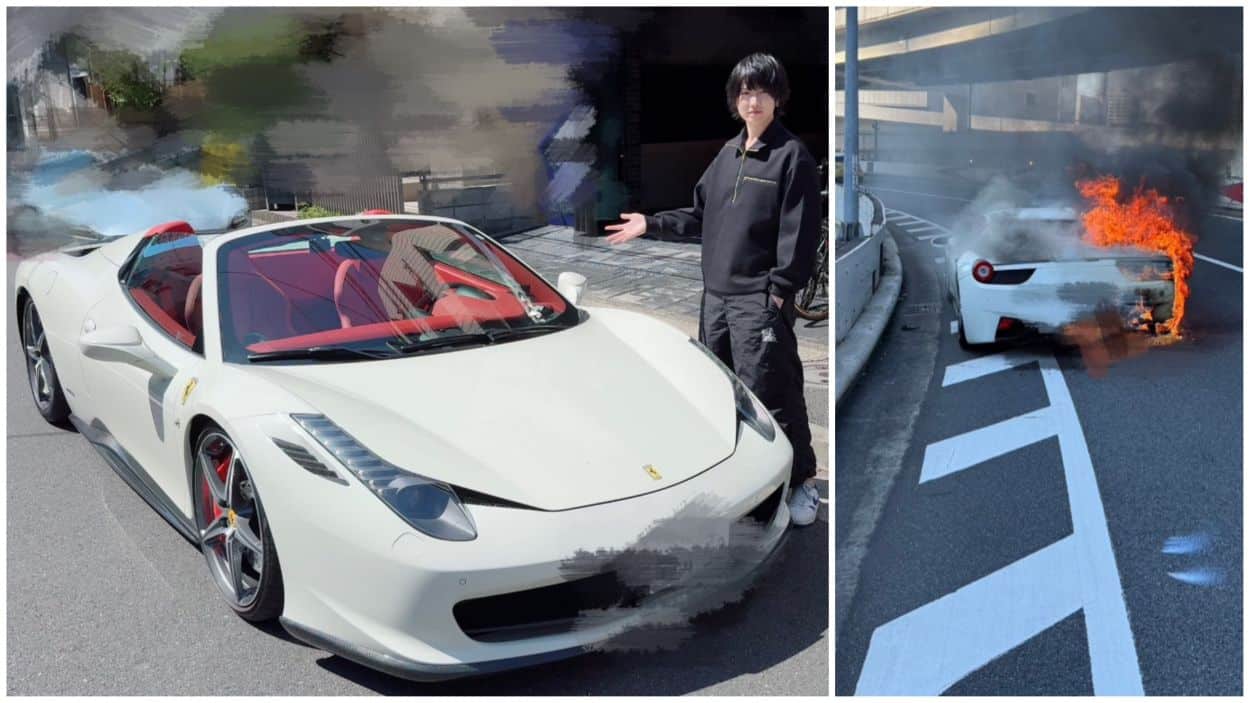On April 24, 2025, a brand-new Ferrari 458 Spider, valued at $300,000, caught fire in the Minato district of Tokyo, owned by music producer Honkon. Just an hour after he drove the supercar off the dealership lot, it caught fire, crushing his decade-long dream.
According to a report by The Sun, a viral event has ignited widespread discussions about the safety of luxury cars. While driving through the streets of Minato, a man named Honkon noticed white smoke coming from the rear of his car. “I was really scared it would explode,” he said. He quickly pulled over, but flames soon engulfed the white Ferrari. Footage recorded by onlookers, which has been viewed over 500,000 times on X, shocked many in Hong Kong as bystanders witnessed the blaze. Firefighters managed to extinguish the fire in approximately 20 minutes, and thankfully, no injuries were reported, although the vehicle was left in ruins.
Tokyo police are investigating the cause of a fire that engulfed a Ferrari 458 Spider, but no official explanation has yet been released.
A Japanese man spent 10 years saving to buy a Ferrari, only for it to go up in flames just an hour after it was delivered pic.twitter.com/H7fNN77HZb
— Dexerto (@Dexerto) April 24, 2025According to the Hindustan Times, the Ferrari 458 Spider features a 4.5L V8 engine and does not have a widespread history of fires. However, 2010 models were recalled due to issues related to adhesive fires. It remains unclear whether the car owned by Honkon was insured, a crucial factor considering that the loss is estimated at $300,000. Similar incidents, such as a supercar fire in Tokyo in 2024, underscore the rare but severe risks associated with these vehicles.
Public Reaction and Viral Spread
Honkon’s social media post detailing the incident drew thousands of reactions, and others questioned Ferrari’s reliability. The viral video amplified scrutiny of high-end car safety, with some praising Honkon’s swift action to avert harm.
The Ferrari fire, a rare event for a model with a 1.5% defect rate, underscores potential risks in high-performance cars, where V8 engines (800°C operating temperature) and complex electronics can trigger fires if faults occur. Honkon’s $300,000 loss, uninsured status unknown, highlights financial vulnerability after a decade of effort. X sentiment is sympathetic but inconclusive, with unverified speculation about defects.
The content balances Honkon’s emotional narrative with technical risks, citing verified sources to avoid speculation. Japan’s rigorous safety standards (98% vehicle compliance) may prompt a Ferrari recall if a systemic issue is found. The incident fuels debates about luxury car reliability versus prestige, particularly in Tokyo’s affluent market (12% luxury car share), but remains an isolated case.
The ongoing investigation will determine the cause of the fire, which could affect Ferrari’s safety protocols.






